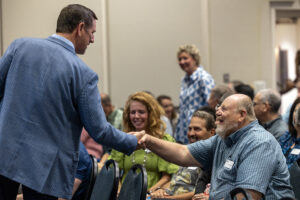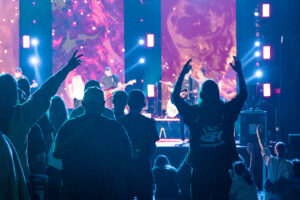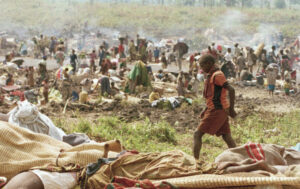
FORT WORTH, Texas (BP)–Many Christians remain troubled why the Wedgwood tragedy — the worst church shooting in U.S. history — was not officially classified as a hate crime and why it has not received more attention from elected leaders and the media.
Although President Bill Clinton, for instance, spoke personally with Wedgwood’s pastor, Al Meredith, and sent a letter of condolence after the shootings that left seven people dead, he mentioned the Wedgwood tragedy in only one speech last fall, while he made 83 references last year to the Matthew Shepherd murder, which occurred in 1998 and has been classified as a hate crime against a homosexual.
Charles Colson, in his Sept. 27, 1999, “BreakPoint” broadcast, responding to a speech by President Clinton, said: “Yes, Mr. President, I heartily agree: Hatred IS a plague on our nation. But I’m curious about why, according to press reports, you seem to have left some people out of your litany.
“You left out, for one, Cassie Bernall, a Colorado girl who died because someone hated Christians. You left out Susan Jones, a Christian seminarian who was shot by someone who entered her church in Fort Worth, Texas, killing her and six other Christians. You left out those three kids who were shot while praying at their high school in Paducah, Ky. Why?
“The president surely is not unaware of these outrages against Christians,” Colson said. “They all received national media coverage, and the link between the shootings and the faith of the victims is well established.
“The answer is, I’m afraid, that, in elite circles, to paraphrase social critic Anthony Daniels, we see the political equivalent of ‘most favored nation’ policy. Victimizing certain groups earns you the condemnation of our political class. But victimize other, unfavored, groups — like Christians — and that same class will yawn, or, as the president did last weekend, just ignore it. Call it ‘tolerance lite.'”
In the media, ABC’s website, for example, pulled up 705 results when searching for Columbine; 142 on the school shootings in Paducah, Ky., during an early morning prayer meeting; and five on Wedgwood, including one on “Nightline.” The Nightline program failed to mention the abusive, anti-Christian words Ashbrook shouted. Instead, it was reported that “Ashbrook calmly conducted his assault.” Meanwhile, Peggy Wehmeyer, ABC’s religion reporter, aired a sound bite from religious radio talk show host Marlin Maddoux “reporting that some feel they are increasingly targeted by anti-Christian bigotry,” according to Brent Bozell of the Internet news site CNSNews.com. Wehmeyer herself, in a Baptist Press interview, said, “This story certainly has not received the attention it deserved.”
Bozell further stated in a Sept. 23, 1999, column, “Suddenly Clueless in Fort Worth:” “So why, despite mounting evidence from Fort Worth, and Paducah and Littleton before that, are Christians not now victims of ‘hate crimes’? Some media outlets — such as CBS, CNN, and Time — apparently believe, to paraphrase Orwell’s ‘Animal Farm,’ that some ‘hate crimes’ are more equal than others.”
Both the Federal Bureau of Investigation and the Fort Worth Police Department have concluded that the murder of seven people at Wedgwood Baptist Church on Sept. 15, 1999, was not officially a hate crime.
The FBI, charged by Congress to keep annual statistics on hate crimes, did not even open a case, Lori Bailey, special agent at the FBI’s Dallas office, told Baptist Press. While an FBI team from Dallas did go to Fort Worth to help gather evidence, Bailey said the decision against classifying it as a hate crime “was made jointly in Dallas with the FBI headquarters in D.C. and the Department of Justice.”
Asked whether strong consideration was ever given to declare the Wedgwood tragedy a hate crime, Bailey said, “It was a strong consideration, but it was not the appropriate route to go” because “[killer Larry Gene Ashbrook’s] statements would not cause us to investigate it as a civil rights matter.” FBI agents did view two videotapes from Wedgwood that captured all the horror after Ashbrook entered the worship center where a youth rally was under way.
Robert Garrity, FBI special agent in charge, said, “[T]his has the appearance of being a very troubled man who … sought to quiet whatever demons that bothered him. I think he was just somebody who was a social outcast. We found evidence that he was a very emotionally disturbed person.”
However, once out of the hands of the FBI, the case became even more unlikely to be classified as a hate crime since Texas is one of only two states with a general hate crimes law that does not identify specific victim groups.
The Wedgwood case “was not a hate crime,” said Lt. David Burgess, public information officer for the Fort Worth Police Department. “We could find nothing that said he was after a particular group, that we could tell. He [Ashbrook] did not say, ‘I’m looking for Baptists or Christians to kill.'”
Fort Worth Police Chief Ralph Mendoza speculated that the death of Ashbrook’s father in July 1999 “may have driven him over the edge.” Longtime neighbors are reported to have said such comments as, “After [his mother] died, he went mental” nine years earlier and “He just didn’t seem right in the head.”
While nothing was found on Ashbrook himself or in his house that “had any connection with a hate group,” said Deputy Fort Worth Police Chief Don Gerland, and no reference to Wedgwood Baptist Church was found in Ashbrook’s journals or other writings in his house, he did unmistakably say anti-Christian phrases in the church Sept. 15.
Ashbrook’s words are recorded both on videotape and in the minds of every person in the room that horrible night. The tapes have been destroyed, upon agreement between the church and the police department, but multiple witnesses said they heard Ashbrook say, “I can’t believe you believe this junk” and heard him shouting anti-Baptist rhetoric and cursing God.
According to Fort Worth police, Ashbrook’s actions possibly stemmed from schizophrenia. “This man had some mental problems and had made some sad comments in the church,” Burgess said, “but nothing was said that could be considered a hate crime.”
Christian outcry against the perceived prejudice began quickly. On Sept. 18, 1999, the Los Angles Times carried the first of several national articles with reference to evangelicals’ concerns after the FBI failed to open a case on Wedgwood.
The next day, the Washington Post wrote: “The murderous rampage last week at a Texas Baptist church exemplified the rising hostility toward Christians in America and abroad and inexplicable reluctance to recognize the shooting as a religious hate crime, national evangelical leaders say.”
Will Norton, dean of the college of journalism at the University of Nebraska-Lincoln and an evangelical Christian, said, “My general feeling is that if there was prejudice, it’s not the media’s fault. It’s society’s fault. [Wedgwood] people responded so graciously, kindly. In our society, that’s not news. It takes an exceptional reporter to see that as news. There would have been more coverage if there had been displays of anger and bitterness, but here we had people coping. The secular media couldn’t grasp what a great story that was.”
On Sept. 29, 1999, House Majority Leader Dick Armey, in a statement on “Religious Bigotry in America,” noted that amidst America’s many achievements “I regret to say that one area where we’re losing ground is our treatment of religious believers. We are witnessing a rising level of bigotry against people of faith, especially Christians,” citing “the tragic shootings in Littleton, Colorado, and Fort Worth, Texas.”
Many questions from the Wedgwood tragedy may never have answers. Why did Ashbrook do this and why at this church? If he had not killed himself, would the story have stayed in the news longer and would the killings more likely have been classified as a hate crime?
Al Meredith, Wedgwood’s pastor, has been invited to speak publicly about the tragedy to groups all across the country, including an hour on CNN’s “Larry King Live.” He repeatedly has said, “We must forgive. I hold no rancor in my heart for the family of Larry Ashbrook. The poor man was deranged. His mind has been twisted by heaven knows what.”
But as a challenge to Christians everywhere, Meredith said Jan. 31 during a Texas Baptist evangelism conference, “[T]here are consequences when Christians do not reach out to people whom others have rejected.”
–30–













